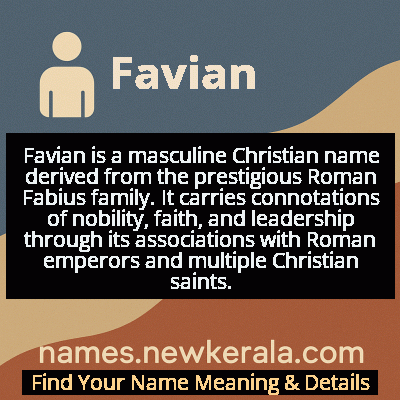Favian Name Meaning & Details
Origin, Popularity, Numerology Analysis & Name Meaning of Favian
Discover the origin, meaning, and cultural significance of the name FAVIAN. Delve into its historical roots and explore the lasting impact it has had on communities and traditions.
Name
Favian
Gender
Male
Origin
Christian
Lucky Number
8
Meaning of the Name - Favian
Favian is a masculine Christian name derived from the prestigious Roman Fabius family. It carries connotations of nobility, faith, and leadership through its associations with Roman emperors and multiple Christian saints.
Favian - Complete Numerology Analysis
Your Numerology Number
Based on Pythagorean Numerology System
Ruling Planet
Saturn
Positive Nature
Ambitious, efficient, realistic, and authoritative.
Negative Traits
Materialistic, stressed, confrontational, and can be overly ambitious.
Lucky Colours
Dark blue, black.
Lucky Days
Saturday.
Lucky Stones
Blue sapphire, amethyst.
Harmony Numbers
2, 4, 6.
Best Suited Professions
Business leaders, managers, financial services, law enforcement.
What People Like About You
Leadership, determination, organizational skills.
Famous People Named Favian
Saint Favian
Religious Figure
Early Christian martyr venerated in the Catholic Church
Favian of Constantinople
Religious Leader
Influential Patriarch of Constantinople in early Church history
Favian R. Alvarez
Artist
Contemporary visual artist recognized for innovative techniques
Name Variations & International Equivalents
Click on blue names to explore their detailed meanings. Gray names with will be available soon.
Cultural & Historical Significance
Extended Personality Analysis
People named Favian often exhibit a unique combination of traditional authority and modern adaptability. Drawing from the name's Roman aristocratic origins, they typically demonstrate natural leadership qualities, strategic thinking, and a calm, measured approach to challenges. There's an inherent dignity and reliability in their character that inspires trust in others. The Christian saint associations contribute to a personality that often values integrity, moral courage, and spiritual depth. Favians tend to be thoughtful rather than impulsive, considering multiple perspectives before making decisions. They're often excellent problem-solvers who can navigate complex situations with both practical wisdom and ethical consideration. While they may appear reserved initially, they possess strong convictions and the courage to stand by their principles. Their blend of historical gravitas and personal warmth makes them effective in leadership roles while maintaining genuine connections with those around them.
Modern Usage & Popularity
In contemporary naming practices, Favian maintains a position as an uncommon but respected choice that appeals to parents seeking names with historical depth without being overly popular. Its usage has remained relatively stable in English-speaking countries, with slight increases in recent years as classical names experience renewed interest. The name finds particular resonance in Catholic and Christian families due to its multiple saintly bearers, and it sees moderate usage in Latin American communities where Spanish variations like Fabián are more common. While it hasn't broken into top name lists, its steady presence indicates enduring appeal among those who value names that combine classical heritage with distinctive character. The name's rarity adds to its appeal for parents wanting something unique yet firmly grounded in historical and religious tradition.
Symbolic & Spiritual Meanings
Symbolically, Favian represents the harmonious integration of temporal power and spiritual virtue. The name's connection to beans in its original meaning symbolizes fertility, sustenance, and connection to the earth—representing practical wisdom and the ability to nurture growth. The Roman aristocratic lineage symbolizes leadership, strategic patience, and enduring legacy, while the Christian saint associations add dimensions of faith, sacrifice, and divine favor. The name embodies the concept of principled leadership—someone who wields authority with moral responsibility. It also symbolizes transformation, bridging the gap between ancient pagan Rome and early Christianity, representing the ability to honor tradition while embracing spiritual evolution. The dove that selected Saint Fabian adds another layer of symbolism—divine guidance and peacemaking abilities.

